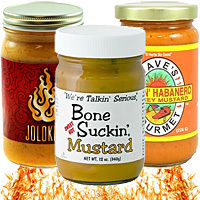
HOT MUSTARDS
![]()
Mustard is a thick yellowish-brown paste with a sharp taste made from the ground seeds of a mustard plant (white or yellow mustard, Sinapis hirta; brown or Indian mustard, Brassica juncea ; or black mustard, Brassica nigra). The mustard seeds are mixed with water, vinegar or other liquids, as well as other flavorings and spices. A strong mustard can cause the eyes to water, burn the palate and inflame the nasal passages. The Romans most likely developed the prepared mustards we know today. They mixed unfermented grape juice, known as "must," with ground mustard seeds (called sinapis) to form mustum ardens, or "burning must."
There are many varieties of mustard which come in a wide range of strengths and flavors. The basic taste and "heat" of the mustard is largely determined by seed type, preparation and ingredients. Black seeded mustard is generally regarded as the hottest type. Preparation also plays a key role in the final outcome of the mustard. Mustard, in its powdered form, lacks any potency; it is the production of Allyl isothiocyanate from the reaction of myrosinase and sinigrin that causes heat to be present. The mustards found in this category are hot and spicier gourmet mustards made with with various chili peppers.
